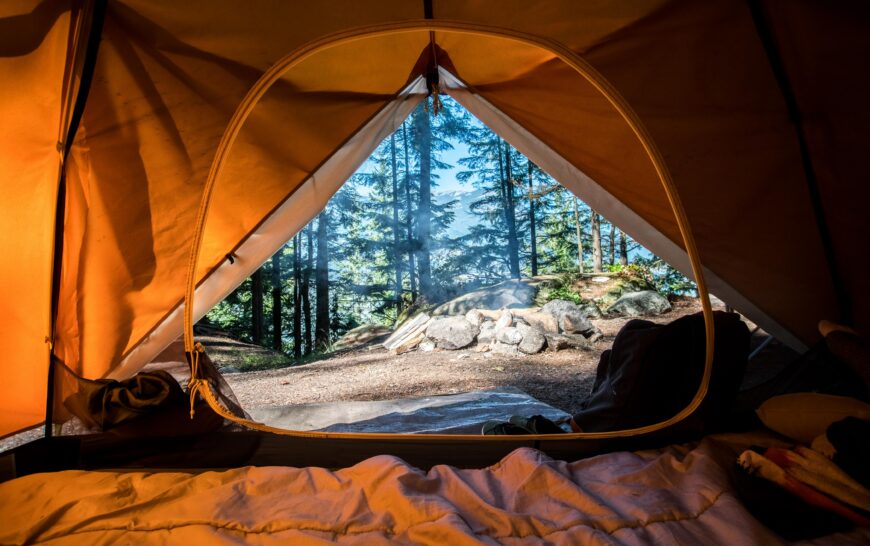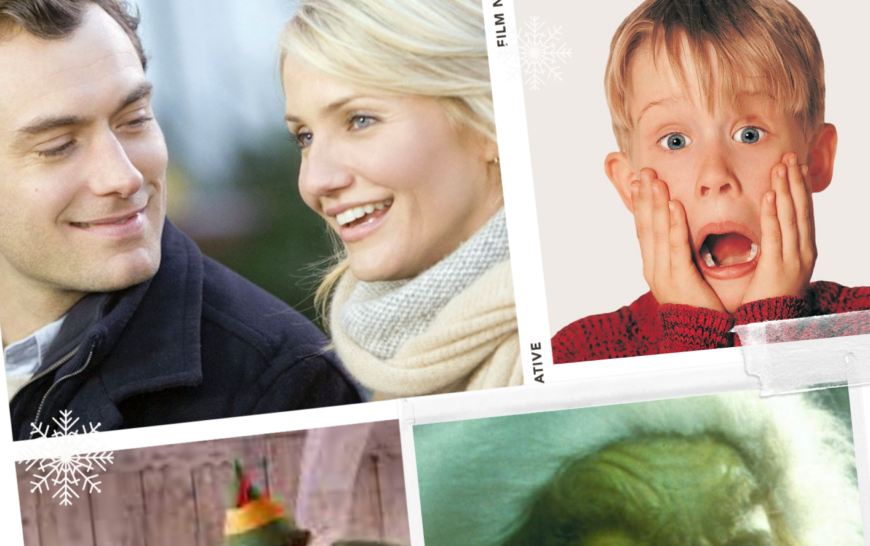
All The Gear, No Idea! A Guide to Camping for Beginners
Like most outdoor activities, the key to a good camping experience is all in the planning. If it’s your first time in a tent and you’re wondering what you need to pack for when you’re out in the elements and at one with nature, we’ve got you covered.
Planning a getaway closer to home has never felt more like a treat as we trade in our resistance bands (we used them a grand total of: never) and threadbare pjs for the thrill of the open road and the great outdoors. Ah, we’ve missed you fresh air and freedom.
The key to a good camping experience is all in the planning.
With the promise of a heatwave on the way (finally. What time do you call this?!) and staycations going nowhere for 2021, you might be thinking about making the most of summer by pitching up in a secluded spot and heading away on a cheap and cheerful camping holi-stay.
Like most outdoor activities, the key to a good camping experience is all in the planning. If it’s your first time in a tent and you’re wondering what you need to pack for when you’re out in the elements and at one with nature, we’ve got you covered.
Here’s a post created with first-time happy campers in mind.
Decide on your vibe
There is more than one way to camp, so the first thing to do ahead of your adventure is decide what kind of camping trip you’re after. Are you down for going back to basics, living off-grid and pitching up in the wild for a while, or is kicking back on a campsite more your cup of tea? If you’re new to camping, you’ll probably be more at ease finding a campsite with amenities to make your first experience straightforward and stress-free. With campsites all over the country from the woodlands to the coast, you’ll have plenty of cool backdrops to choose from. It’s also worth considering whether you need the campsite to be child-friendly or dog-friendly as this might determine where you can stay.
These websites are a great place to start your campsite search:
Bring sleeping bags whatever the weather
Fledgling campers often overlook the sleeping bags but one thing you can’t skimp on when it comes to camping is a good night’s sleep. Even in the balmy summer months, it gets very cold at night so be sure to check the season and temperature rating on your sleeping bag to see if it’s right for when you’re planning to go away. Better yet, put it to the test in the garden to see if it keeps you warm enough. Pick a decent bag – and a sleeping mat to boot to add another layer between you and the ground – and your camping experience will be transformed.
Have a tent rehearsal
Get familiar with your gear! Always practice pitching your tent in your garden ahead of your trip, that way you won’t be caught out when it comes to putting your tent up and taking it down at the campsite. Better to come across a repair job at home than when you’re in the middle of a field surrounded by seasoned campers – a bit of planning goes a long way. In fact, camping out in your garden for a night is a great way to see if the outdoorsy life is for you. Plus, home will always have the best facilities. Ease yourself in gently!
Setting up at the campsite
Arrive nice and early to bag yourself a great spot and pitch your tent while it’s still daytime. Trying to assemble a tent in the darkness is only good for comedy, nothing else.
When you’re ready to settle, look for relatively high-level ground, free from any debris that could damage the tent. Pitching up under the trees amongst the dappled light might sound like the pinnacle of cottagecore dreams but not only are you a target for lightning strikes, the tree sap will make it a nightmare to clean. Opt for a shady spot you can hang out in during the heat of the day and save yourself a sticky situation.
Cook on a camping stove
A lot of campsites don’t allow campfires, but a stove can be just as fun and practical. Set it up away from your tent, out the wind and make sure you stock up on plenty of gas. More than you could ever need. You can pick up a camping stove for quite a fair price these days, and we think you could make a slap-up meal with this double burner from Millets!
Some campsites have washing facilities to clean your dishes but check ahead so you can pack a washing up bowl and cloths if this isn’t the case.
Save any sachets of salt, pepper and sugar from takeaways and decant any oils and condiments into smaller jars and bottles to make them easier to transport.
If your campsite does allow fires, ensure you’re building yours in a designated area, at least five metres away from your vehicle, tent or the surrounding hedgerows.
Plan your meals
Check ahead before travelling to see if your campsite allows campfires and plan what you’re going to cook each night to save you the time and hassle of figuring it out when you’re there, particularly if you’re in a big group and have many mouths to feed. Do a big food shop a few days before to ensure all your grub stays nice and fresh and you’re not stuck snacking on noodles for three days straight.
If all else fails, scope out the local area ahead of travelling to see how far away the local shops and pubs are if things don’t go to plan.
Check how far away the water supply is
It’s a good idea to check the distance to the nearest water source since you’ll be needing to make several trips a day for drinking, cooking and cleaning. You probably won’t fancy lugging a five-gallon container half-way across the campsite after a full day of rounders.
When you’re doing your dishes, have a bowl with warm soapy water for washing and a bowl with clean water for rinsing and ensure you dispose of the dirty water responsibly in approved places.
Size up with your tent
Avoid a crowded tent by going up a size. A general rule of thumb is to opt for a tent that sleeps two more people than you need, so if two of you are camping go for a 4-person tent. This will allow room for backpacks, sleeping bags and all the other bits and bobs holidaying humans take away with them for no apparent reason. A head-height tent also makes camping life that little bit more comfortable for families.
If you’re not sure the camping life will be for you, it’s worth asking a very kind outdoorsy friend if you can borrow their tent rather than fork out for a spenny yurt. Alternatively, to ease yourself into camping, you can always choose to stay in a pre-pitched bell tent to save you the hassle of pitching.
Pack plenty of layers
Fleeces, blankets, rain suits, waterproofs, thick socks – bring it all and cover all bases with a layer for every eventuality. It’s UK camping, who knows what weather you’re going to end up with.
Foldable chairs / loungers are a must
Did you even go camping if you didn’t sit in a chair that was more flexible than you’ll ever be? Sitting on the grass is lovely ‘n’ whimsical for a short while but the most seasoned campers know that a foldable chair is your best chance of a comfortable campfire seat, just in time for s’mores o’clock. Some campsites will provide picnic tables but you can’t really pick that up and plonk it next to the fire.
Leave no trace
It seems like an obvious point to make but we can all lose track of what we did with our crisp packet when we’re invested in a game of Uno. Always put your rubbish away in a secure bin each evening or in your car away from curious critters. When you’re ready to head home, make sure you leave your pitch as tidy as it was when you arrived, or better than when you rocked up. That means clearing your rubbish and taking it home with you or putting it in the bins provided on site, dowsing your fire properly and packing up all your gear. After all, the great outdoors is only great if we look after it.
Make a checklist of essentials
Never underestimate the power of a checklist. They’re great for making sure you don’t leave anything at home from utensils to spare pegs, pillows and… toilet paper.
Here’s a few handy things to add to yours:
Spare tent pegs
Mallet
Sleeping mat/air bed + pump
Pillows
Water carrier
Bin bags
Torch
Camping table for mealtimes
Bottle opener
Cutlery
Tin opener
Chopping board
Matches
SPF
Toilet roll
Hand sanitiser
Insect repellent
First aid kit
Washing up bowls + cloths
Biodegradable soap
Tea towels
Cool bag / box
Towels
Toiletries
Toothbrush
Toothpaste
Shampoo
Thermos flask
Pocket knife
Tinfoil
Cooking oil
Tea/coffee
Milk
Beer/wine
Glasses
Paper towels
Condiments
Newspapers (for the campfire)
Gaffer tape for repairs
Earplugs
Suitable footwear
Spare underwear and socks
Shop our camping edit
*This post contains Ad-Affiliate links



































